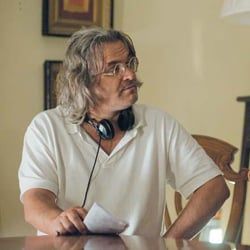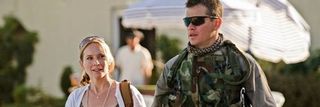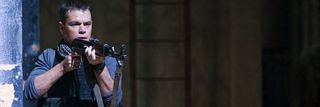Interview: Paul Greengrass Explains The Shaky Cam

Though he hasn’t made a great number of films, making only seven features in 21 years, Paul Greengrass has quickly established a unique filmmaking style that allows the audience to recognize his films from the very first shaky, hand-held shot. Known best for directing the last two films in the Jason Bourne franchise, the director has always been about capturing the essence of the real world and implementing it into his films, be it the true to life events that occurred on September 11th, 2001 in United 93, the Irish civil rights protests in Bloody Sunday or the ongoing Iraq War in Green Zone.
Read our interview with the director who has his own views on the action genre, in which he discusses how a film comes together in post-production, what extra footage we may see on the home release and why he chose to use real soldiers.
You’re known for improvising, for changing, having the script to go off of. How much of the film did you discover or find in the editing process? Could you talk about the post production and what went in?
Well, you sort of can’t talk about the post-production unless you talk about what comes first. All directors make films in individual ways. But the classical kind of view of filmmaking is that you have a script and it’s very linear. There’s a script, then you’re going to shoot the script and then you cut that and then that’s the end of the film. And that’s never really been how I’ve seen it. I always try and bring screenplay, shooting and editing as close into alignment as you possibly can get them, consistent, obviously, with the resources that you’ve got and the time you’ve got available. Because it seems to me that that way that you can get to what I think is the heart of the filmmaking process, which is the relationship between structure, rigidity, form, whatever you want to call it, and freedom, improvisation, the moment, whatever. And those two qualities, you have to have both. You can’t have one without the other, or at least I don’t think you can.
I think when people talk about my style, I think what they’re talking about, and I could be wrong, is two very different and quite extreme ends of that process married together. So I think when you think of my films, I think hopefully you think of an extreme sort of real unfolding, real-time, performed, feeling semi-improvised, you know what I mean, all that. Very real feeling, mixed with very driving and direct, clear and concise and detailed storytelling sort of things and moving with great clarity but feeling that they’re unfolding as if just captured. Well, the reason that I get that, if I do, and I’m just saying, you know what I mean, when it works, which not always it does of course, is because I challenge that linear model and try and bring them into close alignment.
So what does that mean in practice? And this is a way of explaining, answering your question – it means you’ve got to have a screenplay going in. And most of the films that I’ve written, made in my life, I’ve written. Not all, but most I would say. But this one Brian [Helgeland] wrote, but in any case we were a team, in effect. You’re trying to create a screenplay and your screenplay is there to give you a structure, rigidity, situational awareness, who the characters are, what do they want, what’s the shape of the thing, how is it going to go? Those are always the first questions asked, rather than: what’s the dialogue going be? That’s a different issue, right? Now obviously there is dialogue in the screenplay and very good dialogue at that. But you’re looking to get to that solid foundation of structural confidence, so that when you go shooting, you can then open that screenplay up to your actors and make it a very biddable, free process. Then I like to make it very, very free and sometimes I’ll make it freer even than the screenplay is so I can deny a piece of information to the actors so they really are forced to be in the moment. Sometimes if that doesn’t work I might reintroduce the script, but essentially you’re trying to free the thing up. So you’ve had this collision between structure and freedom. Then you get into the cutting room and Chris Rouse, who cuts all my films, will then impose an extreme degree of rigidity at that point and very, very fast, or try to, so that we can then offer that back to the filming process straight away, if resources will allow.

For the purpose of authenticity, you ended up using a lot of genuine soldiers in your film. Could you talk a little about what they brought to the table and, you know, perhaps ways in which they influenced decisions that you ultimately made?
CINEMABLEND NEWSLETTER
Your Daily Blend of Entertainment News
It was impossible not to be trying to stick a Bourne film very close to a kind of real world. What we were trying to do is make it feel like it was kind of ripped out of the headlines. What’s out there is incredibly dramatic. So clearly somewhere what we were distilling in a Bourne film by way of a sort of paranoia and a mistrust and all that stuff, the kind of conspiracy thriller if you like, is what a Bourne film is, was feeling very, very fitting and exciting to that audience. Well obviously that had to have something to do, it seemed to me, it had to do something with the fact that the world seemed very turbulent, and the movies sort of reflect that and they distill it and reflect it back as a kind of paranoid conspiracy thriller and the audience goes, “Yeah, that feels like of now.” So you come to this film and you go: Well, let’s see if we can take one step further into the real world and see if we can build a conspiracy thriller there that’s got the same high energy and high octane and focused, detailed storytelling and smartness and a moral, noble hero with a moral agenda and all that stuff. Not a Bourne film, but with those same elements and instincts that we bring to the table as a partnership, and invite that audience which, after all, is the audience that’s, you know, it’s a young audience, say: “Does that work for you? Does that feel real? Does that feel ‘Bang?’ You know, that excitement of the new?” Is that a way of serving up a conspiracy action thriller, which is a classic genre if you like, but reviving it and making it feel fresh and new and interesting and original? But still maintaining its broad appeal. So that’s kind of where we started from.
So once you get into the shooting of it, you’re saying, “Well, this is a piece. It is those things and it is about Matt and Brendan and Amy and Khalid, and, you know, the story of the film’s kind of a really great story and drive on and blah blah blah blah, but within that we can support the reality of their performances by, say, getting a lot of real guys. Because in the end, rather than cast a lot of actors to play soldiers, it’s much better to get solders to act. ’Cause in the end, they know what you need and I don’t have to explain to them, “Well, it’s in the story. Miller has to hit this house and come narrowly face to face with the Jack of Clubs.” Now you could spend a lot of time finding a lot of actors who can perform that, but in a way you’re really trying to make them behave like soldiers. Well, why not just get solders? It’s easier, and just say, “You’ve been told that’s the house and let’s go.” And so you end up with Matt; some actors with military experience like Jerry Della Salla, who is his number two, who was sort of both in a sense; and then a bedrock of soldiers. And that just made it, I think, much, much, much better for Matt. I mean, you’d have to ask him, but I think it made him just sit in the part and be very real and gave the whole thing that sort of intensity and energy. That’s the thinking anyway.

Can you talk a little bit about what you saw specifically in each of the actors that you cast for their parts? What made them stand out for you?
Well, Matt, ’cause he’s pretty good. And the world’s greatest movie star. Brendan, because I wanted a guy who felt like he’d been in the Middle East a long time and seen it all, and I wanted… I was quite interested in the idea of the CIA guy being a good guy. That felt to me quite original and so we needed an actor who sort of could convey integrity, but within a sort of rough-hewn, pragmatic world view. I think he does that very well.
Khalid, because Freddy was such a very difficult character -- a guy with one leg. It’d be very easy for that character not to really feel like a real person with a real point of view that you really bought into. And he’s just one of the great young British actors.
Amy, because same reason. I wanted a journalist, but I just wanted the journalist to feel very real world and caught up in her own problem. She’s been given this information and now of course she’s coming to check it ’cause it’s not proving…you know, the stuff’s not been found and when she asks the question, she gets fobbed off and then of course then she meets Miller and she has to confess to what happening. So there’s a sort of, a kind of a simplicity and an, um… it wasn’t a big statement. She’s just very real, looked like a working reporter.
And who does that leave? Oh, Greg. Of course. ‘Cause, you know, casting against type. I thought he makes an absolutely superb bad guy. And what’s lovely about his performance, I think, is that you can sort of see that he’s uncomfortable with it all. He really gives it a sense of misplaced idealism, which I think is that the heart of all of that stuff. Very few people do bad things because they’re bad. They generally do bad things because they think they’re the right thing to do, but they’re misplaced. And I think you get a strong sense of that from him. A Jason, because he wears the best moustache in history, and he’s my old mate, so…

What can people expect from this film on the DVD?
Oh, there's nothing. I only shoot, take the boards off and that's the movie. No, I'm joking. There are actually very interesting things because there were a couple of very interesting scenes that go straight to that point you asked and you can see where we tried something initially to try and unfold the story. You can see in the deleted scenes, on particular scene that I'm thinking of where we were trying something to get to the place that we actually got to but we got to it by another scene. It's always interesting I think when you look at that because you see – that's what I'm talking about – the key thing which is that you have to have a sense of what you're aiming for. It's the difference between a map and taking the journey. The screenplay is your map. The more detailed it is the more reconnoiter what your road is actually going to be. But it's not the journey itself. Brian is fantastic. He's one of my best friends and he was with this film with the exception of the strike there from the first day until the day that we finished the cut and put this thing to bed. That's what I'm saying, writing, performing, editing is something that should start with your writing and you gather all three pieces of the process and you need to keep all three pieces of the process as firmly in alignment as you possibly can and then the shooting drops away and you're left with the writing and the cutting until literally the last moment. You're never stopping in the cutting room. I'll be saying, 'What about if we did this, this and this,' and he'll say, 'What about if we did this, this and this?' Then Chris and I will try that. That's the filmmaking process that I recognize and I think that in some ways for all directors. It's some version of that where it's a collaborative conversation and rather like a piece of music where instruments come in and instruments fall away. One almost feels that being a director is to say, 'Look, we don't need the trumpets now but I need to sit with the brass or the strings and get that bit right.' But you're moving forward to the end.

Eric Eisenberg is the Assistant Managing Editor at CinemaBlend. After graduating Boston University and earning a bachelor’s degree in journalism, he took a part-time job as a staff writer for CinemaBlend, and after six months was offered the opportunity to move to Los Angeles and take on a newly created West Coast Editor position. Over a decade later, he's continuing to advance his interests and expertise. In addition to conducting filmmaker interviews and contributing to the news and feature content of the site, Eric also oversees the Movie Reviews section, writes the the weekend box office report (published Sundays), and is the site's resident Stephen King expert. He has two King-related columns.
Most Popular





